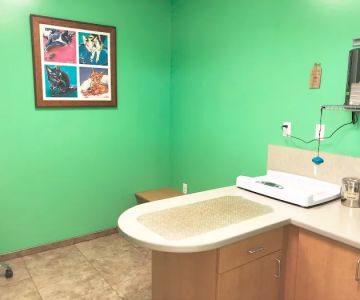How to Become a Veterinarian in South Africa
- Step 1: Understanding the Role of a Veterinarian
- Step 2: Educational Requirements to Become a Vet
- Step 3: Applying to Veterinary Schools in South Africa
- Step 4: Gaining Practical Experience
- Step 5: Becoming Registered and Starting Your Career
Step 1: Understanding the Role of a Veterinarian
Becoming a veterinarian in South Africa is a rewarding but demanding career. As a vet, your job involves diagnosing, treating, and preventing diseases in animals. Vets work in a variety of environments, from animal clinics to wildlife conservation projects. Growing up, I always had a deep love for animals, but it wasn't until I worked alongside a vet during a summer internship that I truly understood the breadth of the profession. It's not just about cuddling cute puppies; it's about being a knowledgeable and compassionate medical professional dedicated to animal care.
What does a veterinarian do?
Vets have many responsibilities, including conducting medical exams, performing surgeries, prescribing medications, and offering health advice to animal owners. Some vets specialize in small animals, like dogs and cats, while others work with larger animals, like horses and livestock. There are also opportunities in wildlife conservation, where you might find yourself working in remote areas to protect endangered species.

110 Marketside Avenue #203, Ponte Vedra Beach, FL 32081, USA
See DetailsWhy become a veterinarian?
The veterinary field offers a unique opportunity to work with animals and make a real impact on their health and well-being. In South Africa, with its diverse wildlife and growing pet industry, becoming a veterinarian is an exciting career choice. I remember how fulfilling it felt to help an injured animal recover and be able to see it return to its natural habitat.
Step 2: Educational Requirements to Become a Vet
To become a veterinarian in South Africa, you need a combination of formal education and practical training. The path involves earning a degree in veterinary science, which typically takes five to six years. The University of Pretoria’s Faculty of Veterinary Science is one of the leading institutions in the country, but there are other universities offering veterinary programs, too.
Required Qualifications
The educational journey to become a vet begins with high school. You’ll need to excel in subjects like biology, chemistry, and mathematics, as these are crucial for veterinary studies. After completing your high school education, you will need to apply for a veterinary program. Admission is highly competitive, and applicants are expected to have a strong academic record, particularly in science subjects.
What’s involved in the veterinary degree program?
The veterinary science degree program covers a wide range of topics, from animal anatomy to pharmacology and surgery. During the first few years, you’ll focus on basic sciences, such as biology, chemistry, and physics, before moving on to specialized veterinary subjects. As you progress through the program, you’ll spend more time in clinical settings, working with animals under the supervision of experienced vets.
Step 3: Applying to Veterinary Schools in South Africa
Getting into veterinary school in South Africa is highly competitive. Each university has its own set of admission requirements, but generally, you’ll need excellent grades in science subjects. I recall the nerve-wracking application process, knowing how important it was to stand out. It’s essential to do thorough research on the universities you’re interested in and make sure you meet all the application criteria.
Top Veterinary Schools in South Africa
The University of Pretoria offers one of the best veterinary programs in the country. It has a well-established faculty with modern facilities and excellent clinical training opportunities. The University of Stellenbosch and the University of Cape Town are also reputable institutions offering veterinary courses. Each of these universities has its unique strengths, so it’s important to consider which one aligns best with your career goals.
Admission Tips
When applying to veterinary school, focus on showcasing your passion for animals and your commitment to the profession. Volunteer at local animal shelters or veterinary clinics to gain experience and demonstrate your dedication. Also, consider pursuing internships or shadowing opportunities to get a better understanding of the veterinary field before applying.
Step 4: Gaining Practical Experience
Once you're accepted into a veterinary program, practical experience will be an essential part of your education. You will spend time in veterinary clinics, hospitals, and animal farms, gaining hands-on experience under the supervision of experienced veterinarians. This part of the training is critical, as it helps you apply what you’ve learned in the classroom to real-world situations.
Internships and Volunteering
In addition to your formal clinical rotations, internships and volunteering are invaluable. I volunteered at a local animal shelter during my summers, which helped me develop skills in handling animals and understanding their health needs. It also allowed me to network with professionals in the field, which can be helpful for finding job opportunities after graduation.
What to Expect in Clinical Training
Clinical training will cover a variety of aspects of veterinary medicine, from diagnosing illnesses to performing surgeries and providing emergency care. I was particularly excited when I had the opportunity to assist in a surgery for the first time—an experience I will never forget. Clinical training helps you build confidence in your abilities and prepares you for the real-world challenges you will face as a vet.
Step 5: Becoming Registered and Starting Your Career
After completing your veterinary degree and gaining the necessary experience, you’ll need to become registered with the South African Veterinary Council (SAVC). This registration is a legal requirement to practice as a veterinarian in South Africa. The SAVC ensures that all registered vets meet the required professional standards and ethical guidelines.
Job Opportunities for Veterinarians
Once you’re registered, the world is your oyster. Veterinarians in South Africa have various career paths to choose from. You can work in private practice, focusing on companion animals, or work in rural areas with livestock. Alternatively, you might find a role in wildlife conservation, where vets are needed to care for endangered species. No matter the path you choose, the demand for skilled veterinarians is high, and the opportunities are vast.
Starting Your Own Practice
Some vets choose to start their own practices. If you decide to go down this route, be prepared for the entrepreneurial side of veterinary medicine. Managing a practice involves handling administrative tasks, marketing, and ensuring the practice runs smoothly. But for those who are passionate about veterinary care, the rewards can be significant.










